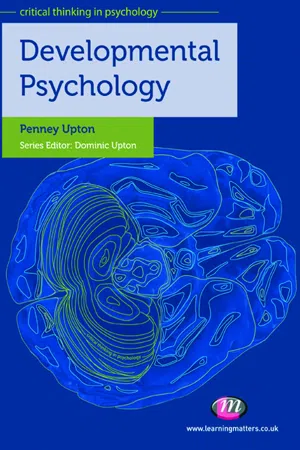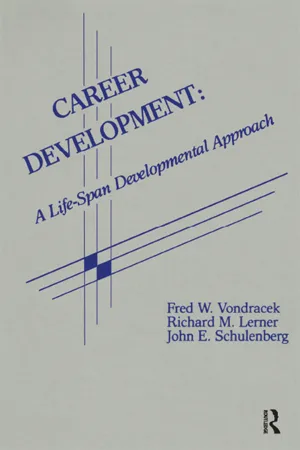Psychology
Issues and Debates in Developmental Psychology
Issues and debates in developmental psychology encompass a range of topics such as nature vs. nurture, continuity vs. discontinuity, and the role of culture in development. These discussions explore the influences on human development and the ways in which individuals grow and change over time. They also consider the impact of social, environmental, and biological factors on developmental processes.
Written by Perlego with AI-assistance
Related key terms
Related key terms
1 of 4
Related key terms
1 of 3
7 Key excerpts on "Issues and Debates in Developmental Psychology"
- eBook - ePub
- Penney Upton(Author)
- 2011(Publication Date)
- Learning Matters(Publisher)
Chapter 7 , for example, we see the way in which cognitive skills can continue to increase in adulthood or decline depending on personal experiences. Developmental psychology informs several applied fields, including educational psychology, child clinical psychology and child forensic psychology, and also complements the other main fields in psychology, including social, cognitive and individual differences.Themes in developmental psychology
There are a number of themes that run right through developmental psychology. These are:- the influence of nature verses nurture;
- continuity versus discontinuity in change;
- critical versus sensitive periods of development;
- stability versus change;
- the role of the individual in development.
Nature versus nurture
As a student of psychology you will come across the nature–nurture debate throughout your studies. It is one of the most fundamental and oldest issues in psychology and philosophy, and one that we will return to in later chapters. The debate concerns the relative contributions of inheritance and the environment in determining our knowledge and behaviour. Philosophers such as Plato and Descartes supported the idea that we are born with knowledge and innate skills. Other thinkers such as John Locke argued for the concept of tabula rasa – the idea that the mind is a blank slate at birth, with experience determining what we know. These philosophical viewpoints have influenced some of the great thinkers in developmental psychology as you will see later on in the chapter.In developmental psychology the debate centres around two main questions.- Are children born with innate knowledge or skills or are these acquired from interaction with the environment?
- Is development driven by external factors or by something inside each individual?
In this context, nature refers to traits, abilities and capacities that are inherited. It includes anything produced by the predetermined unfolding of genetic information. Development that relies on nature alone is known as maturation - eBook - ePub
- Patricia Heindel(Author)
- 2016(Publication Date)
- Research & Education Association(Publisher)
CHAPTER 2 Theories of Development Chapter 2 Theories of DevelopmentThere are several theories that have been offered by psychologists to describe and explain human development. Before examining these theories, it is helpful to understand some of the basic issues on which they agree and disagree.CONTROVERSIAL ISSUES REGARDING DEVELOPMENTNature versus nurtureThe nature versus nurture controversy is an old argument in philosophy and psychology. The question posed in this debate is whether our development is influenced more by the experiences we have (the nurture position) or by the genetic endowment we inherit from our biological parents (the nature position). According to the nurture side, at birth the human mind is like a blank slate, or tabula rasa , that experience writes upon. It is argued that we are shaped by the nurturing, care and environmental influences that impact us. According to the nature view, development is an unfolding process guided by preprogrammed, genetic information. Development is seen as a predictable, predetermined unfolding of inherited traits and abilities. Theories of human development tend to emphasize one or the other of these influences on development, but most theorists agree that it is implausible for nature or nurture to be the sole influence on our growth and development. Both nature and nurture interact from conception forward. The goal of research in development today is to understand the relative influence of each factor in the development of particular traits or abilities like intelligence or personality. In other words, what proportion of mature level of intelligence is the product of experience and what proportion is controlled by genes?Patterns of developmentTheories differ in how they describe development. Discontinuity or stage theories argue that development progresses through a series of stages. Each stage is seen as involving a specific task. Once the task is accomplished, the child moves on to the next stage. The developing person is seen as not changing quantitatively, but qualitatively. Continuity theories - eBook - ePub
Career Development
A Life-span Developmental Approach
- Fred W. Vondracek, Richard M. Lerner, John E. Schulenberg(Authors)
- 2019(Publication Date)
- Routledge(Publisher)
development and/or concepts related to it (e.g., stage, life course). Our presentation is evaluative, however. We often indicate the positions we take in regard to the philosophical and theoretical issues we review, and in so doing we reach, by the end of the chapter, a presentation of the concept of development to which we adhere. Our conception of development is informed by what we term a developmental-contextual (Lerner & Kauffman, 1985) or a probabilistic-epigenetic (Gottlieb, 1970, 1983) model. This conception leads us to see vocational role development as part of a more general developmental process linking the person reciprocally to his or her context. This view is recognized as consonant with the life-span, life-space approach to career development forwarded by Super (1980), but it also is seen to be different by virtue of our emphasis on the reciprocities between developing people and their changing worlds and on the active contributions individuals make to their own development.ISSUES IN DEFINING THE TERM DEVELOPMENTThe meaning of the term development has been the subject of lively philosophical and theoretical debate by psychologists, sociologists, and other social and biological scientists (Collins, 1982; Harris, 1957; Kaplan, 1966, 1983; Lerner, 1984, 1985; Overton & Reese, 1973; Reese & Overton, 1970). The existence of the debate is itself indicative of a key feature of the meaning of the term; that is, development is not an empirical concept. If it were, then inspection of a set of data would simply indicate to any observer whether development was present.However, different scientists can look at a set of data and disagree about whether development has occurred. This is because development is a theoretical concept. It is, as Kaplan (1966, 1983) has put it, a concept of postulation. Conceptual differences exist because different scientists are committed to distinct philosophical and theoretical beliefs about the nature of the world and of human life. For instance, some scientists find it useful to view the world as a machine and to study humans in terms of the energies needed to set the parts of the machine in motion. Other scientists do not find it useful to see humans as machines made up of discrete parts. Instead, they conceive of humans as integrated wholes and study how the structure or the organization of this whole changes over time. - eBook - ePub
Advancing Developmental Science
Philosophy, Theory, and Method
- Anthony S. Dick, Ulrich Müller(Authors)
- 2017(Publication Date)
- Routledge(Publisher)
p.13 Part I Theoretical and Methodological Issues in Development A Relational PerspectivePassage contains an image p.15 2 What is Development? Ulrich Müller and Abigail Graves Introduction
Developmental psychology, lifespan development, and developmental science are various terms used to delineate a field of study that deals, according to an influential definition, with “the description, explanation and modification (optimization) of intraindividual change in behavior across the lifespan, and with interindividual differences (and similarities) in intraindividual change” (Baltes, Reese, & Nesselroade, 1977, p. 4). Thus, the subject matter of developmental science is how a person changes over the life course, and how the process of change is different and similar across persons. This definition, however, does not address the question: what type of change should be considered development? Should any type of change be considered development, or are additional criteria necessary that need to be met for change to qualify as development? Though foundational to the very field of developmental science, this question is rarely discussed. Incidentally, the answer to this question is rather complicated because in trying to answer it, one is immediately entangled with complex issues such as whether development is directed toward a fixed end state, or whether the notion of development is based on values and is thus a normative concept.For more than four decades, Professor Overton (e.g., Overton, 1991, 2010, 2015; Overton & Reese, 1973) has worked on clarifying basic developmental concepts to lay a solid foundation for developmental science. Among the central questions he has addressed in this context is that of what type of changes should be characterized as development. His answer to this question is multifaceted and he does not eschew addressing complicated philosophical questions that arise in this context of this discussion. This chapter is indebted to his work on this topic in many ways. - eBook - ePub
- Patricia H. Miller, Ellin Kofsky Scholnick, Patricia H. Miller, Ellin Kofsky Scholnick(Authors)
- 2014(Publication Date)
- Routledge(Publisher)
IFEMINIST PERSPECTIVES
AND DEVELOPMENTAL PSYCHOLOGY
WHAT ARE THE ISSUES?
Passage contains an image 1
Introduction
Beyond Gender
as a Variable
Patricia H. Miller and Ellin Kofsky ScholnickDevelopmental psychology is inherently interdisciplinary. The complexity of human development requires that those who study it draw on contributions from fields ranging from biology and neuroscience to sociology and anthropology. The discipline has a long history of fruitful assimilation of new ideas from other fields and perspectives. This book represents yet another example of how exciting new scholarship outside of the discipline can contribute in important ways to developmental psychology.Feminist scholarship, an interdisciplinary field, is one of the most influential perspectives in academia today, and has touched nearly every discipline. The number of women’s studies programs has grown from one in 1969 to approximately seven hundred currently, including more than one hundred graduate programs. The top university presses feature feminist books. Ironically, despite its large proportion of women historically compared to most research-oriented disciplines, and despite the large number of articles on gender published annually, developmental psychology has remained almost untouched by this influential intellectual movement (but see, e.g., Belenky, Clinchy, Goldberger, & Tarule, 1986; Burman, 1998; Gilligan, 1982). For example, the chapter that reviews work on gender in the most recent Handbook of Child Psychology (Ruble & Martin, 1998) treats gender as an individual difference variable and a social role without attention to the political, cultural, and power structures in which gender is embedded.Most of the contributors to the volume are mainstream developmental psychologists, often working on gender-related issues. Some have primary or affiliate appointments in women’s studies programs. Their chapters express how their assimilation of feminist approaches has informed and transformed their thinking about their own areas of research. We have titled the volume Toward a Feminist Developmental Psychology - eBook - ePub
- Elliot Hearst, Eliot Hearst(Authors)
- 2019(Publication Date)
- Routledge(Publisher)
1. Developmental concepts are destined to play an increasingly visible role in efforts to understand the functions, controls, and evolution of behavior and cognition. Their neglect during critical phases in the establishment of experimental psychology has been a serious handicap for the organization and analysis of psychological phenomena, both basic and applied.2. In physiological and comparative psychology, the enthusiasm for developmental analyses will not diminish. Indeed, the payoffs have just begun (see Gottlieb, 1976). The application of developmental concepts at both the central and peripheral levels is likely to continue to be a key factor in unraveling the regulation of sensory and motor systems.3. Biological constraints have been shown to play a major role in accounting for differences among species in what is learned and perceived. Differences across ages within a species—comparing neonatal infants and young children and adults—appear to reflect the operation of “developmental constraints” in language, perception, memory, and learning. Such constraints are not constant in development; they are modified over time. The gains to be made from this new view of children as “prepared,” adaptive, and developing organisms are just beginning to be realized in cognitive research.4. The resurgence of evolutionary interpretations of behavior and consciousness in ethology and sociobiology has reminded psychologists of some unfinished business. Having avoided the issues for a half-century, the science is reconfronted with the matters that Darwin, Romanes, J. M. Baldwin, and Binet considered to be central for the new science. They were correct. The recent attempts to unravel developmental contributions to behavioral evolution, and vice versa, will move to the center of the program of theoretical and empirical analysis. The relationship between developmental timing (heterochrony) and evolution has been predicted by Gould (1977) to be the central problem for developmental and evolutionary biology in the 1980s. It may reach the same position for developmental and evolutionary psychology by the 1990s. - eBook - ePub
- Irving B. Weiner, Richard M. Lerner, M. Ann Easterbrooks, Jayanthi Mistry(Authors)
- 2012(Publication Date)
- Wiley(Publisher)
The consistency across chapters in the demonstration of the usefulness of relational developmental systems thinking for theory, research, and application indicates that this frame for contemporary developmental scholarship is not tied necessarily to a particular content domain, but rather is useful for understanding the broader developmental system within which all dimensions of individual development emerge (e.g., Ford & Lerner, 1992; Gottlieb, 1998; Overton, 2010; Sameroff, 2009; Thelen & Smith, 2006). In other words, although particular empirical issues or substantive topics (e.g., perceptual development, successful aging, cognition and achievement, emotional behaviors, or complex social relationships) may lend themselves readily as emphases of developmental scholarship within or across developmental periods, the chapters in this volume attest to the importance of focusing on relational, integrative individual-context dynamics to understand the human developmental system.Conclusions
The power of contemporary developmental science scholarship lies in its integrative character—across substantive domains of individual functioning (e.g., biology, emotional, cognition, and social behaviors), across developmental periods, across levels of organization (from biology through culture and history), and across basic and applied interests in regard to understanding and enhancing human life. As represented by the scholarship in this volume, contemporary developmental science is not limited by (or, perhaps better, confounded by) an inextricable association with a unidimensional portrayal of the developing person (e.g., the person seen from the vantage point of only cognitions, emotions, or stimulus-response connections). Today, the developing person is neither biologized, psychologized, nor sociologized. Rather, the individual is systemized; that is, his or her development is conceptualized and studied as embedded within an integrated, relational matrix of variables derived from multiple levels of organization.This relational approach to developmental science is certainly more complex than its organismic or mechanistic predecessors (Lerner, 2006; Overton, 2010; Overton & Müller, this volume). However, a relational developmental systems approach is also more nuanced, more flexible, more balanced, and less susceptible to extravagant or even absurd claims (e.g., that nature, split from nurture, can shape the course of human development). Moreover, as elegantly demonstrated by the chapters in this volume, relational developmental systems offer a productive frame for rigorous and important scholarship about the process of human development and applications across the life span. Together, these advances in the scholarship of knowledge generation and knowledge application serve as an invaluable means for advancing science and service pertinent to people across the breadth of their lives. Ultimately, then, such applications of developmental science may contribute to the enhancement of social justice (Lerner & Overton, 2008).
Index pages curate the most relevant extracts from our library of academic textbooks. They’ve been created using an in-house natural language model (NLM), each adding context and meaning to key research topics.
Explore more topic indexes
Explore more topic indexes
1 of 6
Explore more topic indexes
1 of 4






